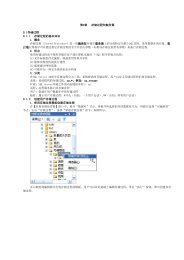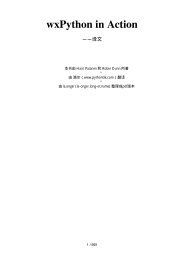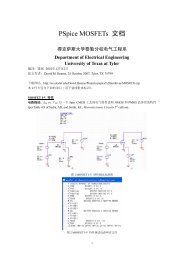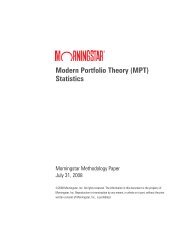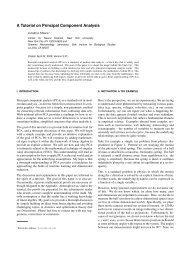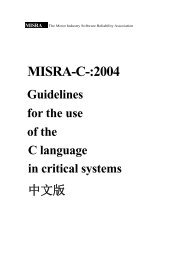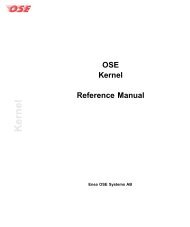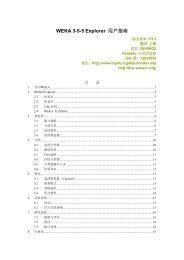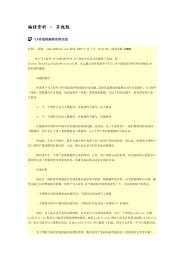Exception Handling ABI for the ARM Architecture
Exception Handling ABI for the ARM Architecture
Exception Handling ABI for the ARM Architecture
You also want an ePaper? Increase the reach of your titles
YUMPU automatically turns print PDFs into web optimized ePapers that Google loves.
<strong>Exception</strong> handling <strong>ABI</strong> <strong>for</strong> <strong>the</strong> <strong>ARM</strong> architecture<br />
<br />
<br />
<br />
<br />
<br />
<br />
<strong>Exception</strong>_class is an 8 character identifier recording <strong>the</strong> originating language and implementation.<br />
Personality routines can use this to determine whe<strong>the</strong>r <strong>the</strong>ir own language originated <strong>the</strong> exception (and, <strong>for</strong><br />
known <strong>for</strong>eign languages whose exceptions this language can catch, how to extract <strong>the</strong> language-specific<br />
data). By convention <strong>the</strong> first 4 bytes indicate <strong>the</strong> implementation and <strong>the</strong> second 4 bytes indicate <strong>the</strong><br />
language. The <strong>ARM</strong> C++ implementation uses <strong>ARM</strong>\0C++\0.<br />
<strong>Exception</strong>_cleanup is used to support multi-language environments and to delete objects that are no longer<br />
required. See §7.6.<br />
Unwinder_cache is reserved <strong>for</strong> use by <strong>the</strong> language-independent unwind library, with <strong>the</strong> proviso that users<br />
of <strong>the</strong> library must initialize <strong>the</strong> reserved1 field to zero be<strong>for</strong>e <strong>the</strong> language-independent unwind routines first<br />
see <strong>the</strong> object.<br />
Barrier_cache is reserved <strong>for</strong> use by <strong>the</strong> language semantics library and personality routine associated with<br />
<strong>the</strong> stack frame in which <strong>the</strong> propagation barrier is located. All use by <strong>the</strong> semantics library routines <strong>for</strong>ms part<br />
of <strong>the</strong> documented interface to those routines (and consequently <strong>the</strong> personality routine is free to use any<br />
members not explicitly claimed by <strong>the</strong> semantics library routines). See §7.3 and §7.4.<br />
Cleanup_cache is reserved <strong>for</strong> use by a personality routine to save internal state whilst a cleanup runs. When<br />
<strong>the</strong> cleanup has finished, <strong>the</strong> personality routine will eventually regain control and it can recover its state from<br />
<strong>the</strong> cleanup cache and resume processing of <strong>the</strong> frame. Typically <strong>the</strong> personality routine would save a<br />
representation of <strong>the</strong> current position within <strong>the</strong> exception handling table. See §7.4.<br />
Pr_cache is reserved <strong>for</strong> use by <strong>the</strong> unwinder <strong>for</strong> passing data to <strong>the</strong> personality routine. The data passed<br />
includes:<br />
- fnstart, <strong>the</strong> start address of <strong>the</strong> function containing <strong>the</strong> apparently throwing call site.<br />
- ehtp, <strong>the</strong> start address of <strong>the</strong> exception-handling table entry.<br />
- additional, a word which may be used to pass additional in<strong>for</strong>mation. Currently only <strong>the</strong> least significant<br />
bit is defined:<br />
Bit 0: single_word_EHT, a flag set if and only if <strong>the</strong> exception-handling table entry is known to occupy<br />
precisely one word. (Language-independent unwinding code only inspects <strong>the</strong> first word of <strong>the</strong> EHT<br />
entry and doesn’t comprehend anything beyond that.)<br />
There are several routines concerned with unwinding:<br />
_Unwind_Raise<strong>Exception</strong> begins a new exception propagation. See §7.3.<br />
_Unwind_Resume resumes an existing exception propagation after execution of a cleanup. See §7.4.<br />
_Unwind_Complete is called to indicate that <strong>the</strong> current propagation is entirely finished, and that <strong>the</strong> unwinder<br />
may per<strong>for</strong>m any appropriate housekeeping. The details are implementation-defined, but see §7.7.<br />
_Unwind_Delete<strong>Exception</strong> is described in §7.6.<br />
7.3 Phase 1 unwinding<br />
In phase 1, <strong>the</strong> stack is virtually unwound looking <strong>for</strong> a propagation barrier.<br />
The language raising <strong>the</strong> exception will have allocated and initialized an ECO, and will <strong>the</strong>n (from C++ via<br />
__cxa_throw, see §8.4) call <strong>the</strong> language-independent routine _Unwind_Raise<strong>Exception</strong> with a pointer to <strong>the</strong><br />
UCB. This begins <strong>the</strong> propagation.<br />
_Unwind_Raise<strong>Exception</strong> captures <strong>the</strong> machine register-state on entry and copies it to a VRS. It copies <strong>the</strong> return<br />
address from VRS[r14] to VRS[r15] <strong>for</strong> <strong>the</strong> initial index table lookup. This saved state will be used repeatedly later.<br />
_Unwind_Raise<strong>Exception</strong> should also allocate any resources required by <strong>the</strong> implementation to per<strong>for</strong>m <strong>the</strong><br />
propagation (<strong>the</strong>se can later be deallocated by _Unwind_Complete – see §7.7 <strong>for</strong> fur<strong>the</strong>r remarks).<br />
_Unwind_Raise<strong>Exception</strong> copies <strong>the</strong> VRS to a “temporary VRS” to preserve it over <strong>the</strong> stack scan. Scanning <strong>the</strong>n<br />
proceeds as follows:<br />
<strong>ARM</strong> IHI 0038A Copyright © 2002-2005, 2007 <strong>ARM</strong> Limited. All rights reserved. Page 22 of 50



